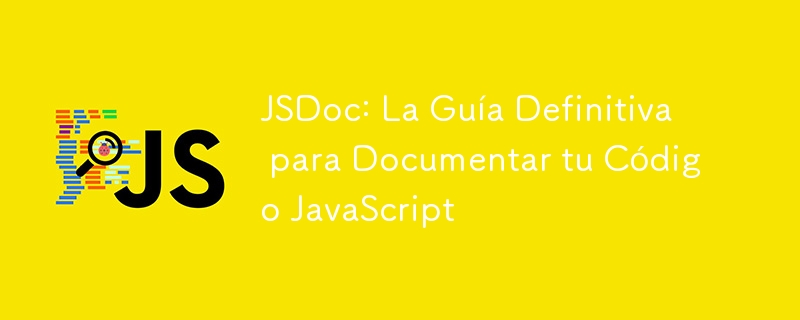

JSDoc is a documentation tool for JavaScript that allows you to add typed and structured comments to your code. Similar to JavaDoc for Java, JSDoc not only helps document your code, but also improves the development experience with autocompletion and type information in modern editors like Visual Studio Code.
JSDoc comments start with /**and end with*/:
/**
* Calcula el área de un rectángulo.
* @param {number} ancho - El ancho del rectángulo
* @param {number} alto - El alto del rectángulo
* @returns {number} El área del rectángulo
*/
function calcularArea(ancho, alto) {
return ancho * alto;
}
Document the parameters of a function:
/**
* @param {string} nombre - Nombre del usuario
* @param {number} [edad] - Edad del usuario (opcional)
* @param {Object} opciones - Opciones de configuración
* @param {boolean} opciones.activo - Estado del usuario
* @param {string} opciones.rol - Rol del usuario
*/
function crearUsuario(nombre, edad, opciones) {
// Implementación
}
Specifies the return value:
/**
* @returns {Promise<User>} Promesa que resuelve con los datos del usuario
*/
async function obtenerUsuario() {
// Implementación
}
Define custom types:
/**
* @typedef {Object} Usuario
* @property {string} id - ID único del usuario
* @property {string} nombre - Nombre completo
* @property {number} edad - Edad del usuario
* @property {string[]} roles - Lista de roles asignados
*/
/**
* @param {Usuario} usuario
* @returns {boolean}
*/
function validarUsuario(usuario) {
// Implementación
}
Defines types for callback functions:
/**
* @callback ValidatorCallback
* @param {string} valor - Valor a validar
* @returns {boolean} Resultado de la validación
*/
/**
* @param {string} dato
* @param {ValidatorCallback} validador
*/
function procesarDato(dato, validador) {
if (validador(dato)) {
// Procesar dato
}
}
/**
* @param {Array<string>} nombres - Lista de nombres
* @param {Object.<string, number>} edades - Mapa de nombres a edades
*/
function procesarDatos(nombres, edades) {
// Implementación
}
/**
* @param {string|number} id - ID que puede ser string o número
* @param {?string} descripcion - Descripción opcional (puede ser null)
*/
function buscarElemento(id, descripcion) {
// Implementación
}
/**
* Representa un vehículo genérico.
* @class
*/
class Vehiculo {
/**
* Crea una instancia de Vehiculo.
* @param {string} marca - Marca del vehículo
* @param {string} modelo - Modelo del vehículo
* @param {number} año - Año de fabricación
*/
constructor(marca, modelo, año) {
this.marca = marca;
this.modelo = modelo;
this.año = año;
}
/**
* Calcula la edad del vehículo.
* @returns {number} Edad en años
*/
obtenerEdad() {
return new Date().getFullYear() - this.año;
}
}
Create a jsconfig.json file in the root of your project:
{
"compilerOptions": {
"checkJs": true,
"strictNullChecks": true,
"strictFunctionTypes": true
},
"exclude": ["node_modules", "dist"]
}
npm install -g jsdoc
Create a jsdoc.json file:
/**
* Calcula el área de un rectángulo.
* @param {number} ancho - El ancho del rectángulo
* @param {number} alto - El alto del rectángulo
* @returns {number} El área del rectángulo
*/
function calcularArea(ancho, alto) {
return ancho * alto;
}
/**
* @param {string} nombre - Nombre del usuario
* @param {number} [edad] - Edad del usuario (opcional)
* @param {Object} opciones - Opciones de configuración
* @param {boolean} opciones.activo - Estado del usuario
* @param {string} opciones.rol - Rol del usuario
*/
function crearUsuario(nombre, edad, opciones) {
// Implementación
}
/**
* @returns {Promise<User>} Promesa que resuelve con los datos del usuario
*/
async function obtenerUsuario() {
// Implementación
}
/**
* @typedef {Object} Usuario
* @property {string} id - ID único del usuario
* @property {string} nombre - Nombre completo
* @property {number} edad - Edad del usuario
* @property {string[]} roles - Lista de roles asignados
*/
/**
* @param {Usuario} usuario
* @returns {boolean}
*/
function validarUsuario(usuario) {
// Implementación
}
/**
* @callback ValidatorCallback
* @param {string} valor - Valor a validar
* @returns {boolean} Resultado de la validación
*/
/**
* @param {string} dato
* @param {ValidatorCallback} validador
*/
function procesarDato(dato, validador) {
if (validador(dato)) {
// Procesar dato
}
}
JSDoc is a powerful tool that significantly improves the quality and maintainability of your JavaScript code. With the right IDE support and documentation generation tools, you can create a more robust and maintainable codebase.
The above is the detailed content of JSDoc: The Definitive Guide to Documenting Your JavaScript Code. For more information, please follow other related articles on the PHP Chinese website!




